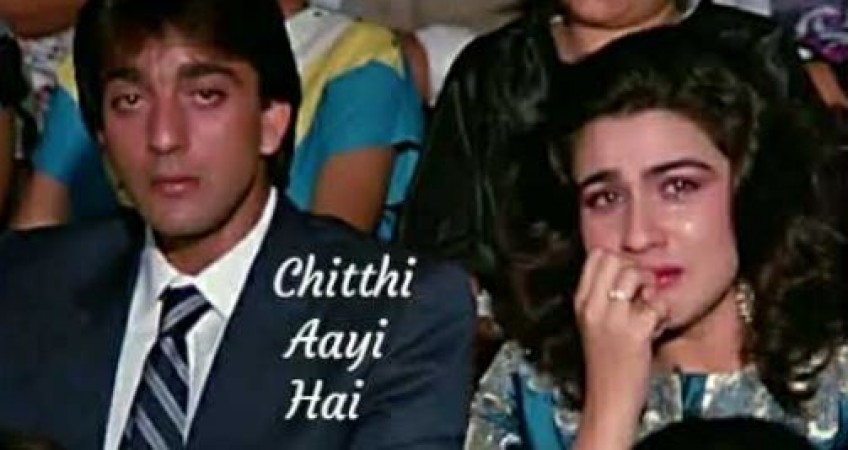
Some songs in the rich tapestry of Indian cinema have gone beyond their status as merely musical interludes and transformed into cultural icons, leaving their imprint on subsequent generations. "Chitthi Ayi Hai," a song that captivated the nation and came to represent a specific period in Indian history, is an example of a timeless melody. This article investigates how "Chitthi Ayi Hai" came to be such a phenomenon, striking a chord with the dreams and ambitions of a people travelling to the Middle East in search of success.
Khayyam, a renowned music director, and Kaifi Azmi, a renowned lyricist, collaborated on the poignant and soul-stirring song "Chitthi Ayi Hai." Mahesh Bhatt's "Naam," a 1982 Bollywood film, marked its debut as its first appearance. With Kumar Gaurav and Poonam Dhillon playing the main characters, the movie told the story of a family that was torn apart by circumstances and had a sizable portion of the action take place in Kuwait in the Middle East.
Pankaj Udhas' song, which was not just a musical interlude but also a reflection of the feelings of an entire generation, was performed. It discussed longing, separation, and the suffering caused by having loved ones who are far away. Particularly in the 1970s and 1980s, when many Indians were leaving their homeland in search of opportunities in the Middle East, the lyrics struck a powerful chord with the emotions those people were going through.
Indians made a sizable exodus to the Middle East in the 1970s and 1980s, drawn by hopes for prosperity and financial security. The Gulf nations beckoned with promises of well-paying jobs, tax-free income, and the possibility of a better life. Particularly, Kuwait, Oman, Qatar, and the United Arab Emirates piqued interest. During this time, Indian migration underwent a sea change as millions sought employment abroad.
This migration did not, however, come without difficulties and problems. Families were split apart as the breadwinners left their loved ones behind in search of financial stability. "Chitthi Ayi Hai" perfectly captured the feelings of this separation by showing the agony of waiting for a letter, or "chitthi," to come from a faraway country with information about the loved one's well-being.
The song "Chitthi Ayi Hai" connected with the Indian audience on several levels. It was a musical masterpiece first and foremost. A song that was hard to ignore was made possible by Pankaj Udhas's velvety voice, Khayyam's soulful composition, and Kaifi Azmi's heartbreaking lyrics. It quickly rose to prominence as an anthem for those who longed for the safe return of loved ones who were serving in the Middle East.
The song's placement in "Naam" was also well thought out. The challenges that the Indian diaspora in Kuwait faced were intricately woven into the story of the movie along with the theme of migration. In addition to highlighting the movie's main theme and leaving an enduring impression on the audience, "Chitthi Ayi Hai" served as a strong emotional anchor.
The popularity of the song spread outside the boundaries of the theatre. Due to the fact that it reflected their own experiences and feelings, people started to relate to it personally. Similar to the protagonist of the song, families eagerly anticipated letters from their loved ones stationed abroad.
The phenomenon of "Chitthi Ayi Hai"'s theatre reruns sets it apart from other songs. The film was so well-liked that audiences frequently insisted on seeing it even after it had ended. This unusual occurrence demonstrates the song's enduring appeal and capacity to have a profound emotional impact on listeners.
The reruns were more than just a way to indulge the audience's nostalgia; they stood for a shared experience. Collectively watching and rewatching the song brought people comfort and camaraderie. It became a shared cultural landmark, encouraging a sense of cohesion among those who had gone through the hurt of separation.
"Chitthi Ayi Hai" continues to hold a special place in the hearts of Indians, both at home and abroad. Even decades after its release, it remains a popular choice at cultural events, weddings, and gatherings, where it evokes a wave of nostalgia and sentimentality. The song's enduring legacy is a testament to its emotional resonance.
"Chitthi Ayi Hai" is a historical record of a time when the pain of separation tempered the dreams of migration, in addition to being a work of brilliant music. It serves as a reminder of the sacrifices people who left their homes in search of a better life for their families made. In this way, the song goes beyond just being a popular Bollywood song and represents the journey of the entire Indian diaspora.
"Chitthi Ayi Hai" is more than just a song; it's an anthem that captures the aspirations, struggles, and trials of a generation of Indians who travelled to the Middle East in search of their fortunes. The phenomenon of reruns in theatres and its enduring popularity both highlight how deeply it has affected the national psyche. With its eerie melody and moving lyrics, "Chitthi Ayi Hai" serves as a timeless ode to those who set out on that journey, taking us back to a time when the hope for a better future was inextricably linked with the agony of separation.
Sridevi's Resolute Performance in 'Kisi Ke Haath Na Aayegi Yeh Ladki'
Hrithik Roshan's Silent Revolution in Disability Representation